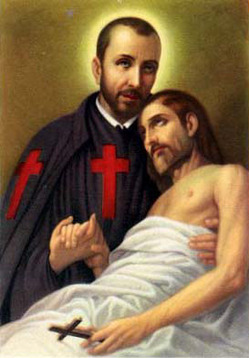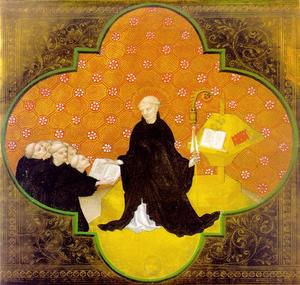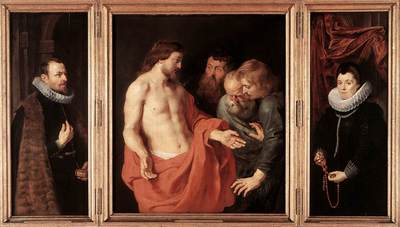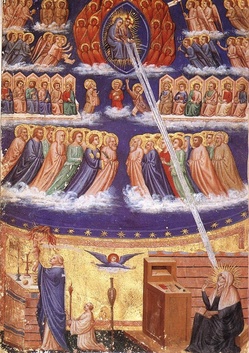 Lord, our God, you revealed the secrets of heaven to Saint Bridget as she meditated on your Son’s Passion. Grant that we your servants may find great joy when your glory is revealed.
Lord, our God, you revealed the secrets of heaven to Saint Bridget as she meditated on your Son’s Passion. Grant that we your servants may find great joy when your glory is revealed.
Category: Saints
Saint Mary Magdalene: Disciple of the Lord
 Early in the morning of the first day of the week, when Jesus had arisen, he first appeared to Mary Magdalene, from whom he had driven seven devils.
Early in the morning of the first day of the week, when Jesus had arisen, he first appeared to Mary Magdalene, from whom he had driven seven devils.
Saint Elijah (Elias) the Prophet
An angel in the flesh, the foundation of the prophets, and the second forerunner of Christ, the glorious Elijah from on high sent grace to
Elisha, to cure sicknesses & cleanse lepers. He likewise overflows with
healing for those who honor him.
(Troparion of the feast, Tone 4)
Let all Christ’s Church assemble here
And, gathered in His holy Name,
Keep solemn, joyful festival
To sing of great Elijah’s fame.
Of all the prophets who foretold
God’s hidden plan of saving grace,
He is the chief: to him we give,
The Tishbite, now the choicest place.
He called the folk of Israel
Back to their covenant with God;
Through kingly wrath and violence
God’s narrow way of truth he trod.
When earthly tasks for him were done,
You called him in a special way:
A fiery chariot came for him,
Foretelling Christ’s ascension day.
For all the graces You have giv’n
Through what Elijah did for You,
Your Church on earth gives endless praise,
O Father, Son, and Spirit true.
L.M. (88.88)
James Michael Thompson (2009)
Saint Camillus de Lellis
As the Father has loved me, so have I loved you; abide in my
love. If you keep my commandments, you will abide in my love, just as I have
kept my Father’s commandments and abide in his love. These things I have spoken
to you, that my joy may be in you, and that your joy may be full.
Father, you
gave Saint Camillus a special love for the sick. Through his prayers inspire us
with your grace, so that by serving you in our brothers and sisters we may come
safely to you at the end of our lives.
A bio on Saint Camillus
Blessed Kateri Tekakwitha
Lord
God, you called the virgin, blessed Kateri Tekakwitha, to shine among the
Indian people as an example of innocence of life. Through her intercession, may
all peoples of every tribe, tongue, and nation, having been gathered into your
Church, proclaim your greatness in one song of praise.
The National Shrine of Blessed Kateri Tekakwitha staffed by the Conventual Franciscans.
Saint Henry: emperor, husband and Benedictine Oblate
Today’s saint, Henry II, is one of the few monarchs admitted to the canon of saints. Emperors along with civil and canon lawyers don’t seem to be too plentiful among the communion of saints. Henry was in fact an emperor, a husband and a Benedictine oblate. Throughout his life Henry devoted himself to the evangelization of peoples, the support of the Church (materially and spiritually), and is known to have attended to his spiritual life by being faithful to lectio divina, praying the Divine Office and the sacred Liturgy, and doing works of mercy and charity for the poor and marginalized. He is reported to have lived very chastely with his wife. Also important for us here is the fact that as king, Henry followed the Rule of Saint Benedict with a degree of seriousness that was rather unheard of, even among the monks and nuns. As Saint Benedict lived his earthly life and enjoined on his followers a sense of attentiveness to the reality of the final judgment, Henry conformed his life to the same: as Benedict had a concern for the welfare of brothers, he also instilled in them a heightened sense of Christ’s final judgment, and so did Henry. Do we?
Saint Benedict (and his 12 degrees of humility)
God our Father, You made Saint Benedict an outstanding guide
to teach men how to live in your service. Grant that be preferring your love to
everything else we may walk in the way of your commandments.
Famous for his work on the 12 degrees of humility, Saint Benedict proposes the following for those who want to advance in the spiritual life. The degrees of humility are given below.
The first degree of humility, then, is that a man always
have the fear of God before his eyes (cf Ps 35[36]:2), shunning all
forgetfulness and that he be ever mindful of all that God hath commanded, that
he always consider in his mind how those who despise God will burn in hell for
their sins, and that life everlasting is prepared for those who fear God. And
whilst he guard himself evermore against sin and vices of thought, word, deed,
and self-will, let him also hasten to cut off the desires of the flesh.
The second degree of humility is, when a man love not his
own will, nor is pleased to fulfill his own desires but by his deeds carried
out that word of the Lord which said: “I came not to do My own will but
the will of Him that sent Me” (Jn 6:38). It is likewise said:
“Self-will hath its punishment, but necessity win the crown.”
The third degree of humility is, that for the love of God a
man subject himself to a Superior in all obedience, imitating the Lord, of whom
the Apostle said: “He became obedient unto death” (Phil 2:8).
The fourth degree of humility is, that, if hard and
distasteful things are commanded, nay, even though injuries are inflicted, he
accept them with patience and even temper, and not grow weary or give up, but
hold out, as the Scripture said: “He that shall persevere unto the end
shall be saved” (Mt 10:22). And again: “Let thy heart take courage,
and wait thou for the Lord” (Ps 26[27]:14).
The fifth degree of humility is, when one hides from his
Abbot none of the evil thoughts which rise in his heart or the evils committed
by him in secret, but humbly confesses them. Concerning this the Scripture
exhorts us, saying: “Reveal thy way to the Lord and trust in Him” (Ps
36[37]:5). And it said further: “Confess to the Lord, for He is good, for
His mercy endures forever” (Ps 105[106]:1; Ps 117[118]:1). And the Prophet
likewise said: “I have acknowledged my sin to Thee and my injustice I have
not concealed. I said I will confess against myself my injustice to the Lord;
and Thou hast forgiven the wickedness of my sins” (Ps 31[32]:5).
The sixth degree of humility is, when a monk is content with
the meanest and worst of everything, and in all that is enjoined him holds
himself as a bad and worthless workman, saying with the Prophet: “I am
brought to nothing and I knew it not; I am become as a beast before Thee, and I
am always with Thee” (Ps 72[73]:22-23).
The seventh degree of humility is, when, not only with his
tongue he declares, but also in his inmost soul believeth, that he is the
lowest and vilest of men, humbling himself and saying with the Prophet:
“But I am a worm and no man, the reproach of men and the outcast of the
people” (Ps 21[22]:7).
The eighth degree of humility is, when a monk doeth nothing
but what is sanctioned by the common rule of the monastery and the example of
his elders.
The ninth degree of humility is, when a monk withholds his
tongue from speaking, and keeping silence doth not speak until he is asked; for
the Scripture shows that “in a multitude of words there shall not want
sin” (Prov 10:19); and that “a man full of tongue is not established
in the earth” (Ps 139[140]:12).
The tenth degree of humility is, when a monk is not easily
moved and quick for laughter, for it is written: “The fool exalts his
voice in laughter” (Sir 21:23).
The eleventh degree of humility is, that, when a monk speaks,
he speak gently and without laughter, humbly and with gravity, with few and
sensible words, and that he be not loud of voice, as it is written: “The
wise man is known by the fewness of his words.”
The twelfth degree of humility is, when a monk is not only
humble of heart, but always lets it appear also in his whole exterior to all
that see him; namely, at the Work of God, in the garden, on a journey, in the
field, or wherever he may be, sitting, walking, or standing, let him always have
his head bowed down, his eyes fixed on the ground, ever holding himself guilty
of his sins, thinking that he is already standing before the dread judgment
seat of God, and always saying to himself in his heart what the publican in the
Gospel said, with his eyes fixed on the ground: “Lord, I am a sinner and
not worthy to lift up mine eyes to heaven” (Lk 18:13); and again with the
Prophet: “I am bowed down and humbled exceedingly” (Ps 37[38]:7-9; Ps
118[119]:107)
Saint Augustine Zhao Rong & companions
Father, we celebrate the memory of Saint Augustine Zhao Rong
and his companions who died for their faithful witnessing to Christ. Give us
the strength to follow their example, loyal and faithful to the end.
Saint Augustine Zhao Rong, a Chinese diocesan priest who was
martyred with 119 companions in 1815. Among their number was an
eighteen-year-old boy, Chi Zhuzi, who cried out to those who had just cut off
his right arm and were preparing to flay him alive: “Every piece of my
flesh, every drop of my blood will tell you that I am Christian.”
Saint Maria Goretti
Father, source of innocence and lover of chastity, you gave Saint Maria G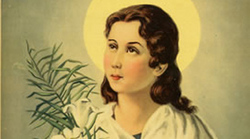 oretti the privilege of offering her life in witness to Christ. As you gave her the crown of martyrdom, let her prayers keep us faithful to your teaching
oretti the privilege of offering her life in witness to Christ. As you gave her the crown of martyrdom, let her prayers keep us faithful to your teaching
Saint Maria Goretti is an example for the new generations who are threatened by a non-commital attitude that finds it difficult to understand the importance of the values which admit of no compromise. [But] do not let the consumer culture and pleasure numb your conscience! Be an alert and vigilant “watchmen”, be the real champions of a new humanity. (Pope John Paul II, 7 July 2002)
Saint Thomas
Because thou has seen Me, Thomas, thou has believed. Blessed are they that have not seen, and yet have believed, alleluia.

